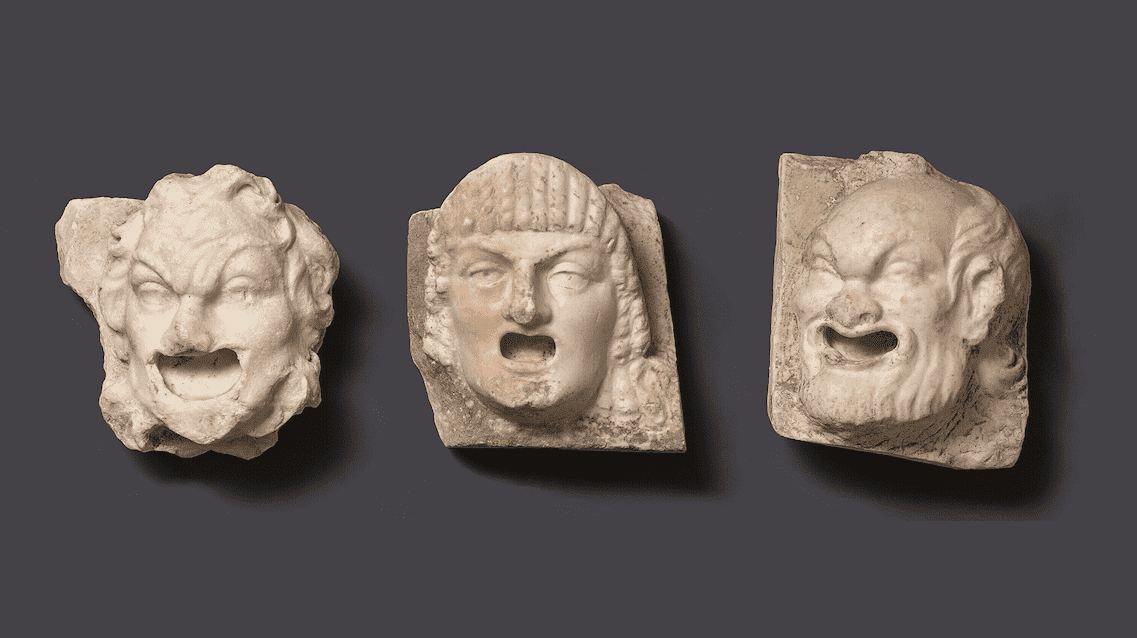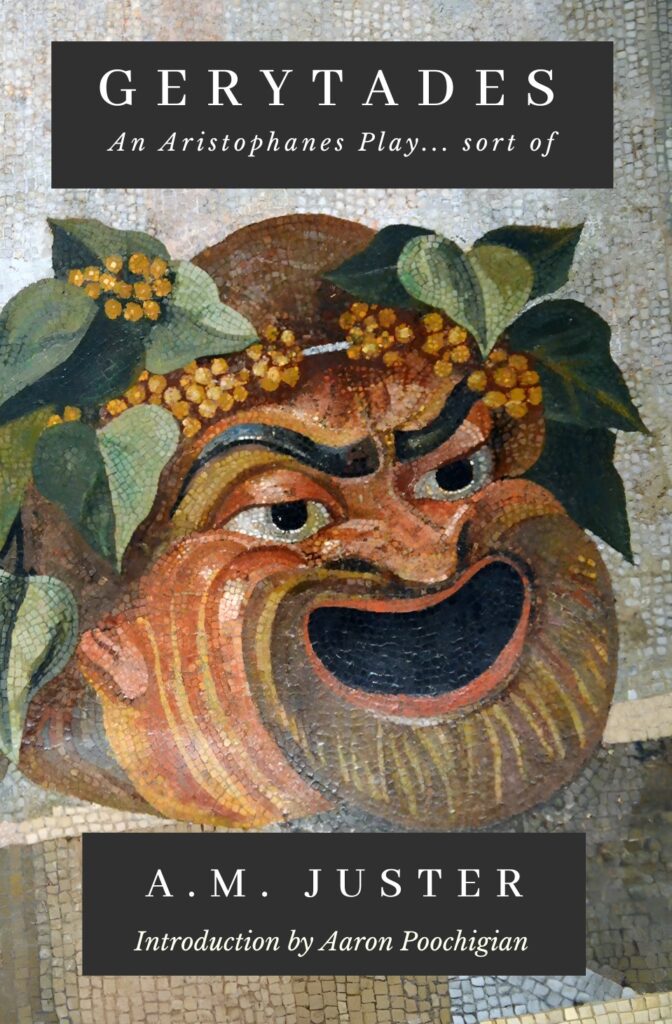
Third century theatrical masks at Musée Saint-Raymond, CC BY-SA 4.0, via Wikimedia Commons

Around 407 BC, the Greek comic dramatist Aristophanes wrote Gerytades. The play today survives (or, rather, doesn’t) only in fragments so few that even the role of the titular character is unclear. However, a handful of references to the work in other sources, and those few fragments that do exist, attest to the purpose of the narrative, which was a quest to recover true poetry (probably personified by Orpheus) from the Underworld, and thereby redeem it from the poor use to which custom and volume had put it. Just a couple of years later, in 405 BC, Aristophanes wrote The Frogs, dealing with a similar topic: Dionysius’ attempt to recover Greek tragedy from the Underworld.
Two and a half thousand years later, taking Jeffrey Henderson’s edition of Aristophanes’ Fragments (2007) as his text, and Aristophanes’ The Frogs as his inspiration, A.M. Juster (or Justerides), has produced his version of Gerytades—but not a translation, as he self-deprecatingly observes in his prologue:
…so please abandon any expectation
that what this “hack” has done is real translation.
It’s not—it is pastiche, pastiche infused
with modern spice (in case you are confused).
Although there are bits of translated material here and there, Juster is only being honest: without an unexpected literary discovery, no one can today produce a translation of Gerytades. But it is possible to look at the extant corpus and those other mentions of the play, and then to imagine what might have been. Successful conclusions to unfinished symphonies have been attempted with less. The most important factor for success is whether the new creation has the ring of truth to it—whether, in this case, it reads like something written by Aristophanes. Comparing Juster’s Gerytades to The Frogs (for which I used Paul Roche’s English translation as a means to compare like to like), it is clear, in tone at least, that Juster succeeded.
To be clear, Juster’s Gerytades is not a play. It is a narrative poem, in rhyming couplets, which describes the action of its characters in the way that a play might be read aloud: “X says this, and then the chorus replies…” But beyond the difference in genre, there is so little tonal separation between Roche’s version of The Frogs and Juster’s version of Gerytades that the latter is completely convincing. There’s the coarse language of the Greek dramatist here and there, and the low humour which still gets a laugh after thousands of years, but there is also the barbed commentary and the sharp wit of Aristophanes which is just as pointed today, both in his canonical works and in Juster’s imagining. For our modern poets, too, wrestle with the abuse of their art by best-sellers who are incapable of writing a single poetic line, let alone building an oeuvre that will withstand the test of decades (to say nothing of centuries or millennia).
The abusers of poetry ancient and modern are personified by the three main characters, the anti-heroes of Gerytades. Their ostensible goal may be the recovery of the embodiment of true poetry but, having been pressed into that service by the titular Gerytades, their real motivations are far more earthy:
The ferryman is absent, so they rest
and dream about the payoffs from their quest:
high praise from poetry communities,
great publication opportunities,
good food, fine wine, luxurious retreats,
and funding from Athenian elites.
These hack poet anti-heroes were well-known to the Greeks, and in Gerytades they represent three major forms of poetic craft. Well-described in Aaron Poochigan’s excellent introduction, they are Sannyrion, the thin comic playwright, known for being a little too free with using the work of other poets; Meletus, the tragedian, who became one of Socrates’ fatal accusers a few years after Gerytades was performed; and Cinesias, the author of innumerable dithyrambs, whose bad poetry appears in other works by Aristophanes. Gerytades charges them with their quest, and then guides them, Virgil-like, to the gates of Hell—but no farther. Their misadventures to that point do not augur well and, suffice to say, they return empty-handed.
Juster is right to make them unsuccessful; in The Frogs, Dionysius is able to rescue Aeschylus from the Underworld, although the task is a challenging one. But the three poetical anti-heroes of Gerytades are not gods—they are not even good poets. They are, in fact, a group of losers, and their equivocating failure is merely the apt terminus of their own manifest insufficiency. The hilarious proposition, both for the ancient Greeks and for our own time, is the attempted recovery of a lost art by people who are themselves some of its most flagrant desecrators. The fact that they have money and women says nothing about the quality of their verses—or perhaps it says everything about them and their audiences. Consider the innkeeper’s daughters, who fawn over the poets. They are as undiscerning as the masses who applaud the poets’ turgid lines:
The innkeeper has three gorgeous daughters
who love the body of each poet’s work—
or maybe bodies of just any jerk;
they, one by one, escape the dining room
and lure the poets out into the gloom.
Not merely undiscerning, the three daughters are—like the uncritical audiences—actively misleading. Their attentions lure the poets away from their urgent quest and leave them waking blurry-eyed, discombobulated, but content. Only later will they discover that this one night of pleasure has not only set them back, but destroyed any prospect of success—and quite curtailed their poetic aspirations as well.
Once the poets get moving again, they make their way through reality and fantasy until they see the fabled sign over the gate to Hell, although the wording in Gerytades is more friendly than usual in declaring, “WELCOME, TRAVELERS, TO HELL.” Here, too, is misdirection: it’s not a nice place, despite the charms of Orpheus’ music echoing through the air. Cerberus is on the prowl, and the river Styx has a distinctly fœcal stench. Worse still, the chorus of critics has pursued the poets to offer an occasional, taunting commentary on events. Attempts to chase them off prove repeatedly unsuccessful: an accomplished critic himself, Juster knows that Hell is full of them.
Immersed in the rank gloom of Hell itself, the three tortured poets dither, pontificate, and argue; yet, somehow, they find themselves on the cusp of success. It’s their earlier decisions that damn them—that dalliance with a too-receptive audience undoes what would have been an unlikely and epic success. So, they trundle back towards home, screwing Gerytades out of his horse and cart, and thinking of ways to spin failure into success. They never get there. Like all bad poets, they are revealed to be politicians at heart: they excel not in paying homage to beauty, but in manipulating large audiences and satiating their appetites. The last line is a call for more booze.
A reviewer should be cautious not to write a review which is longer than the subject of the review. At only 468 lines, Gerytades is much shorter than The Frogs, and if there is a criticism to be levelled, it is length: what Juster has given us is provocative, wickedly delightful, but—dash it all!—too short. Modern readers are indeed plagued with short attention spans, and publishers are keenly allergic to poems longer than a few pages, but more is wanted to combat the debasement of the age. The talentless hacks have commanded enough attention—their tuneless warbling is unceasing; it clogs up the airwaves, it fills countless bookshelves, it hogs all the top spots in the best-selling lists. Faced with such poetical oppression, we must not turn to our own, modern equivalents of Sannyrion, Meletus, and Cinesias. Let us have Justerides, instead.